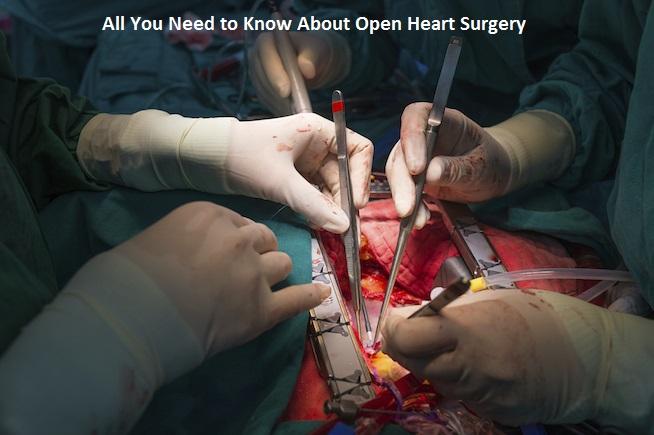Notifications

8 minutes, 14 seconds
-23 Views 0 Comments 0 Likes 0 Reviews

Surgery is the medical procedure performed to cure a disease, injury, or deformity. It can help to cure various diseases, from repairing injuries to addressing chronic conditions. These surgical procedures can restore your health, improve quality of life, and, in many cases, save lives. Open heart surgery is a surgical procedure that involves opening the chest cavity and operating on the heart directly. This article will help you understand the process of heart surgery to alleviate your anxiety and stress.
Open heart surgery is done to treat a wide range of heart disorders, including coronary artery disease, heart valve disease, and congenital heart defects. There are two basic types of open-heart surgery:
On-pump surgery: This type of surgery involves using a heart-lung bypass machine that takes over the roles of the heart and lungs, allowing the surgeon to work on a still heart. This can be advantageous for certain types of operations, including coronary artery disease as the heart is usually still during this operation.
Off-pump surgery: In this type of surgery, the surgeon operates on the heart while it continues to beat. While this method can be less invasive than on-pump surgery, it is not appropriate for every procedure.
The process of preparing for heart surgery starts with a consultation with a cardiologist or cardiac surgeon. Your doctor can conduct diagnostic tests such as echocardiograms, ElectrocardioGrams (EKG), stress tests, or cardiac catheterisation to determine whether surgery is necessary. Once the diagnosis is confirmed, your medical team will discuss the procedure, its benefits, risks, and what to expect regarding outcomes.
Getting ready for heart surgery involves several medical evaluations and changes to your lifestyle. It is advisable to visit your doctor frequently to know more about the procedure and any precautions if needed:
Medical Tests: For medical tests, you will undergo blood tests, and chest X-rays to evaluate your overall health and assess for any potential issues.
Medications: Your doctor may advise you to stop taking certain medications, like blood thinners, a few days before the surgery.
Lifestyle Adjustments: This involves quitting smoking as it increases the risk of complications from your surgery. Eating a balanced diet and moderate exercise can enhance your fitness level for the surgery.
Hospital Admission: To finalise preparation for your heart surgery, you will be admitted to the hospital a day before.
This may sound scary but open heart surgery usually takes between 3 and 6 hours. It usually depends on the complexity of the procedure. Here’s a guide about what happens during the surgery:
This is the first step during the surgery where you will receive general anesthesia to keep you unconscious and free from pain. Once the anesthesia kicks in, the surgical team will clean the area and make an incision in your chest to reach the heart.
In most situations, a heart-lung machine is utilised to take over the roles of your heart and lungs. This enables the surgeon to work on a still heart. However, some procedures, like off-pump coronary artery bypass grafting (CABG), can be done while the heart is still beating.
After the initial steps, you will be operated based on your condition. The common conditions for which you may require an heart surgery include:
Coronary Artery Bypass Grafting (CABG): This type of surgery helps to improve the blood flow to the heart.
Valve Repair or Replacement: This type of surgery helps to repair the valves of a damaged heart.
Atrial or Ventricular Septal Defect Repair: This type of surgery helps to correct the congenital heart defects by separating the heart walls. These defects in the heart’s structure are closed using patches or sutures.
After completing the procedure, the surgeon will carefully close the chest incision using wires or sutures. You will then be moved to the intensive care unit (ICU) for close monitoring.
After the surgery, you must stay in the hospital for further monitoring and other post-surgery procedures. Here’s what you can expect:
In the ICU, the medical team will monitor your vital signs and help you manage any pain. You may have tubes and catheters in place to drain fluids, deliver medications, and assist you in breathing. Additionally, you may experience fatigue, soreness, and swelling, which are a few common post-surgery symptoms.
Recovering from heart surgery can take anywhere from several weeks to a few months. Here are some important aspects of the recovery journey:
Hospital Stay: Most patients stay for about 5 to 10 days. During this period, the medical staff will monitor for any complications, such as infections or irregular heart rhythms.
Pain Management: You will be given medications to help control pain and lower the risk of blood clots.
Follow-Up Appointments: It is crucial to have regular follow-ups with your cardiologist to track your recovery progress.
Diet and Lifestyle: Embracing a heart-healthy diet, managing stress effectively, and quitting smoking are vital steps in preventing future heart issues.
Open heart surgery may sound scary but it becomes necessary when you are dealing with a certain disease, injury, or deformity. It is a life-changing procedure that demands thorough planning and preparation. Familiarising yourself with the pre-operative, operative, and post-operative stages helps you approach the journey more confidently. While these surgeries are very expensive and may eat up your savings, it is necessary to consider the best health insurance in India.
Here’s when Niva Bupa mediclaim policy comes to the rescue. It offers a comprehensive plan and covers all your costs from hospitalisation charges to post-surgery costs. It provides a sigh of relief to its customers to have a stress-free treatment.

